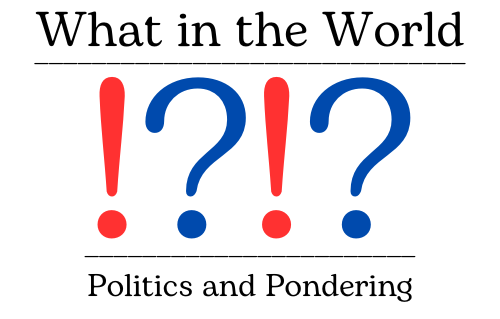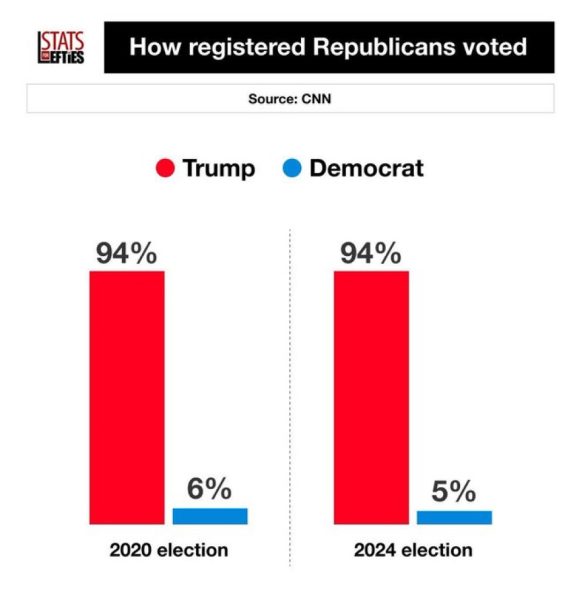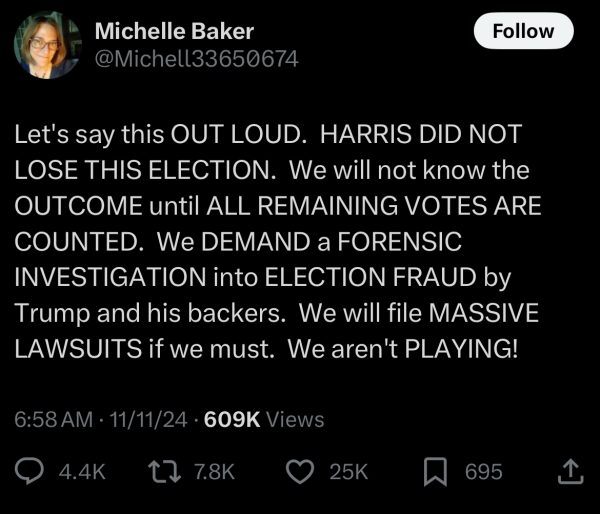
“What in the World” is a monthly column where I go over world events and connect them to one overarching theme, so that I may ramble on about what I think people should learn from current events while also educating people on what’s going on in the world.
My goal here is to tell you “what in the world,” by letting you know the facts: what’s happening. Then, also to answer your question, “what in the world?” by giving you insight as to how human nature led us to such events, and how they should be received.
Well, this edition, we’re talking about how Kamala Harris lost the election. If you know me, you can probably guess that I’m disappointed. Regardless of any feelings I may have on the outcome of the election , there are ways in which we as a nation must proceed, and there are ways (taken in the past) that we must avoid.

What happened to Harris’ seemingly successful campaign?
Well– Kamala Harris’ campaign was flawed in many ways. One of her most severe shortcomings was her pandering to Republicans. Instead of focusing on minority votes, which she assumed she had by being a minority herself, she tried continuously to appeal to white, middle-aged woman voters throughout her political campaign, as seen in her television advertisements. Additionally, people agree that she failed by trying to appeal to a seemingly nonexistent voter base– undecided Republicans. She included Liz Cheney, who is a former Republican Rep. and daughter of former Republican Vice President Richard Cheney, in her campaign trail in an attempt to not only seem more aligned with right-wing policies to appeal to a republican voter base but also to emphasize one of many popular phrases during her campaign: “Country over party.”
This slogan brings me to the next weakness of Harris’s campaign, which was that she, like many other democrats in the past, relied on Donald Trump’s weaknesses– rather than her own strengths– to win. The difference between Harris’s and Trump’s rallies was the connection to the candidates. Trump had built a fanbase for himself– an army of loyal devotees who’d vote for him regardless of his prior actions. Harris’s main concern on the campaign trail was demonizing Trump; not only did that not affect his fans, but it weakened her campaign by leaving little room for her to gain fans. She attracted voters by telling them, “Here’s why Donald Trump shouldn’t be voted for,” rather than “Here’s why I should be voted for.” There were very few undecided republican voters, to begin with. While she may have won their vote, she did nothing to the population of Trump supporters, even through immense effort, and lost more progressive voters who sought radical decisions on current affairs to third-party candidates.
What about concerns of voter fraud?

Whispers of election fraud are spreading like wildfire within the democrats of America. Elon Musk, a known protegee and supporter of Donald Trump, owns Starlink, an internet provider company, and was connected to ballot-counting machines in some counties. Many leftists are claiming that Elon Musk and Donald Trump hatched a plan to “rig” the election. While people are allowed to be upset at Harris’s loss– or rather, Trump’s victory– I don’t think it should seem entirely improbable that Donald Trump won the election. As I mentioned before, his voter base is full of unwavering support for him and anything he may do, so the fact that Harris’s tactics did nothing to take voters from him should be unsurprising. However, the fact that many people were predicting and anticipating Harris’s win makes her loss all the more incredulous to many of her supporters, leading them to become suspicious. The combination of desperation, fear, and outrage has led them to seek answers to rationalize the loss of her seemingly already-claimed title. Of course, the plain and simple answer is that more people voted for Donald Trump than Kamala Harris.
Still, because of their (somewhat justified) unwillingness to accept the truth, they have sought answers not only for an explanation for their overwhelming loss but also to try and reverse the outcome of the election because they are scared of what to expect from the future under a president who has promised to condemn those who didn’t support him in the past. This threat is outlined in Project 2025, an initiative made by (and seemingly for) Trump’s closest allies in America. In the 900-odd pages of the proposal, there are specific calls for repealing the protections of freedom of assembly, along with restrictions to voting access. Both of these reforms are likely to give Donald Trump more power and will be used to punish exclusively those who don’t support him. Naturally, such a future is unwanted by democrats and other Harris voters, and, while irrational, plotting to evade it should not be unexpected.

What do we do next?
Well, the last thing anyone wants is a repeat of January 6th, and with tensions between political parties already high, the best thing for Harris supporters to do is lose gracefully. When observed in accordance with each other, the results of the 2020 and the 2024 elections demonstrate a complete inability of Trump’s biggest supporters to show humility either in loss or in success. When they lost, they stormed the capital, led and instructed by a bitter, defeated Donald Trump. When they won, they tweeted obscene things about women’s rights and posted misleading infographics alleging that Democrats tried to rig the election. It seems as though no matter what the outcome of this election was, the nation would divide more. However, both sides feel dignified in their separation from the other. Leftists commonly feel that Republicans’ views on social issues are detrimental to society, and many right-leaning voters feel that democratic economic and foreign policies are.

Like my previous edition about polarization foretold, the future of politics comes down to interpersonal relationships between people with opposing viewpoints. The best advice I can give to people who were hoping to see a Harris victory is this: maintain a respectful demeanor and accept people with open arms if or when they realize what a Trump presidency truly means for them and their families.
Editor’s Note: The ideas and claims shared in this article are the opinions of the writer. These views may not represent those of the adviser; of the Trail staff as a whole; of the Trail’s advertisers; of the administration, faculty or staff of McIntosh High School; of Fayette County Public Schools or of the FCBOE School Board members.


